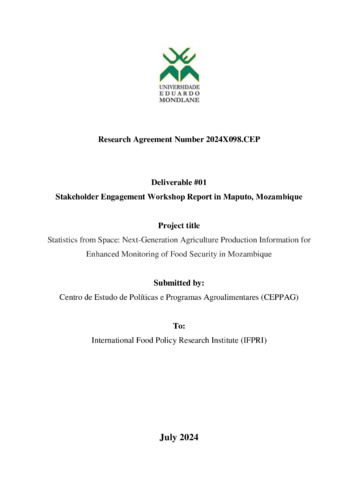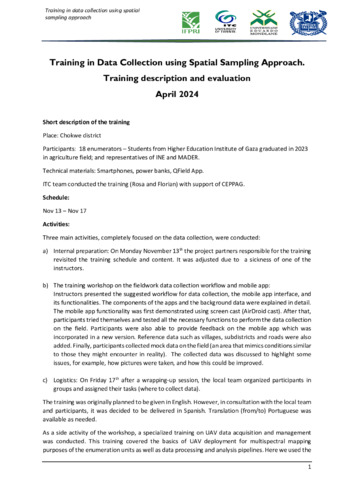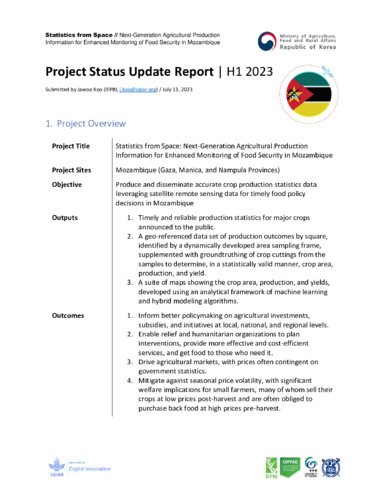In Mozambique the unreliable and untimely agricultural production data are both a symptom and a cause of relatively low agricultural investment and development in recent decades. In assessing the government’s progress of implementing the National Agricultural Investment Plan (NAIP; referred to in Mozambique as the Plano Nacional de Investimento do Sector Agrrio, or PNISA) for example, ReSAKSS (2014) noted that their analysis of public expenditure was constrained by a lack of sufficiently disaggregated data along functional, geographical, sub-sectoral, and commodity lines. Moreover, the information collected were conflicting, depending on the source and the accounting system used within the government.
NAIP is a national program that aims to operationalize Plano Estratégico para o Desenvolvimento do Sector Agrário (PEDSA: 2010 – 2020) and aligns with Mozambique’s Five-Year Government Plan and the Comprehensive Africa Agriculture Development Program (CAADP). The PEDSA was developed to cover a period of 10 years (2011-2020), and its Result Area 1, the Food Crop Program, monitors the production, harvested area, and yield of major food crops annually. These are relevant to the agricultural information system that this project aims to support and strengthen.
The main objective of the project is to produce and disseminate accurate crop production statistics data leveraging satellite remote sensing data for timely food policy decisions in Mozambique. To enable this, the project will:
- co-design and co-develop timely and reliable agricultural production information with government agencies in Mozambique, and
- help internalize the next generation agricultural production monitoring system in the country governments through research, technology, and technical partnership.
The project will implement activities in four interconnected components in parallel:
- Component 1. Stakeholder engagement: Conducting a baseline assessment and strategizing for the data uptake and impacts on development outcomes through the continued engagement with stakeholders, including the Ministry of Agriculture and Rural Development and smallholder farmers.
- Component 2. Enhanced area frames: Developing dynamic area sample frames to improve data reliability, using satellite remote sensing data and triangulated crop production information from previous surveys.
- Component 3. Digital collection of groundtruth data: Collecting groundtruth data using digital tools to support the analytical framework development and data validation.
- Component 4. Crop analytics: Developing a machine learning algorithm-based analytical framework to improve the timeliness of crop production estimates.
IFPRI will oversee the implementation of all activities in collaborative efforts with the University of Twente; the Centro de Estudos de Políticas e Programas Agroalimentares, Universidade Eduardo Mondlane; and the Seoul National University.
Recent Project Outputs
International Food Policy Research Institute (IFPRI). 2023. Statistics from Space: Next-Generation Agricultural Production Information for Enhanced Monitoring of Food Security in Mozambique. PowerPoint presentation given during the Project Kickoff Meeting (virtual), January 12, 2023
International Food Policy Research Institute (IFPRI). 2023. Statistics from Space: Next-Generation Agricultural Production Information for Enhanced Monitoring of Food Security in Mozambique. Component 1. Stakeholder engagement for impacts. PowerPoint presentation given during the Project Inception Workshop, VIP Grand Hotel, Maputo, Mozambique, April 20, 2023
ITC/University of Twente. 2023. Statistics from Space: Next-Generation Agricultural Production Information for Enhanced Monitoring of Food Security in Mozambique. Component 2. Enhanced area sampling frames. PowerPoint presentation given during the Project Inception Workshop, VIP Grand Hotel, Maputo, Mozambique, April 20, 2023
Centro de Estudos de Políticas e Programas Agroalimentares (CEPPAG). 2023. Statistics from Space: Next-Generation Agricultural Production Information for Enhanced Monitoring of Food Security in Mozambique. Component 3. Digital collection of groundtruthing data. PowerPoint presentation given during the Project Inception Workshop, VIP Grand Hotel, Maputo, Mozambique, April 20, 2023
Seoul National University (SNU). 2023. Statistics from Space: Next-Generation Agricultural Production Information for Enhanced Monitoring of Food Security in Mozambique. Component 4. Crop analytics for forecasting yields. PowerPoint presentation given during the Project Inception Workshop, VIP Grand Hotel, Maputo, Mozambique, April 20, 2023
Bofana, Jose. 2023. Mapping cropland extent over a complex landscape: An assessment of the best approaches across the Zambezi River basin. PowerPoint presentation given during the Project Inception Workshop, VIP Grand Hotel, Maputo, Mozambique, April 20, 2023
Mananze, Sosdito. 2023. Examples of remote sensing application in agriculture monitoring. PowerPoint presentation given during the Project Inception Workshop, VIP Grand Hotel, Maputo, Mozambique, April 20, 2023
Manuel, Lourenco. 2024. Statistics from space: Next-generation agricultural production information for enhanced monitoring of food security in Mozambique: Stakeholders Workshop. Presentation given June 18, 2024 at the Stakeholder Workshop at the VIP Grand Hotel, Maputo, Mozambique. Washington, DC: International Food Policy Research Institute. https://hdl.handle.net/10568/149124














